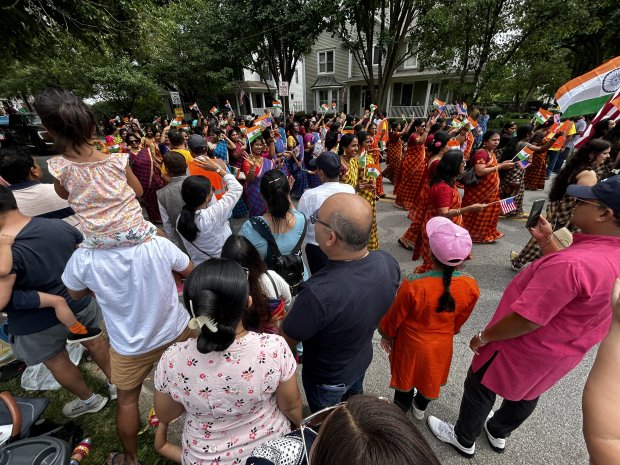After months of delay, a new migrant shelter for families is opening at the shuttered St. Bartholomew Catholic Church in Portage Park later this month, Mayor Brandon Johnson announced late Friday.
Johnson had said in January the city would not establish any new shelters amid a spat with Gov. J.B. Pritzker about the state’s role in directly providing housing for thousands of migrants who had arrived in Chicago in recent months, citing rising city costs. At the time, however, he left the door open to collaborations with faith and social service providers to run shelters.
Friday’s announcement noted the city would not incur any cost for the new shelter.
The Archdiocese of Chicago is leasing the space to the city, which is subleasing the school building and convent to the Zakat Foundation, a Bridgeview-based charity founded by Muslims to help address poverty internationally.
Zakat “will assume all operational costs, including logistics and staffing for the shelter,” according to a Johnson administration news release, while adhering to the city’s shelter operation guide. The charity will also coordinate with Chicago Public Schools to help enroll students.
Cook County is overseeing construction of shower facilities and other renovations to accommodate families there, according to the release, which did not disclose the cost of those renovations. The county pledged to contribute as much as $70 million this year to help cover the city’s cost of food and other expenses to respond to the migrant crisis.
“This initiative represents a remarkable example of what can be achieved when the public, private, and non-profit sectors collaborate towards a common goal,” Johnson said in the release. “My administration’s Office of Immigrant, Migrant, and Refugee Rights brought together an intergovernmental and an interfaith coalition to the table to work out this agreement.”
Zakat’s executive director, Khalil Demir, said the organization was “honored to assist the city of Chicago in this most important work of providing shelter for the refugee and the displaced, ensuring each family finds resettlement, retraining, new-language literacy, education, and earning through trade and jobs.”
In all, 38,624 individuals seeking asylum have arrived in the city since the beginning of the crisis, according to city data. 9,680 people were staying in shelters as of Friday. Another 84 people are awaiting placement. Johnson recently announced he would move asylum-seekers out of shelters that had been set up at a handful of Park District facilities across the city.
Other shelters in the city’s system are grappling with outbreaks of measles and a “small number” of confirmed tuberculosis cases, health officials separately confirmed Friday. The Chicago Department of Public Health declined to answer questions on the exact number of migrants with active cases or which shelters were affected.
When the city first unveiled plans to locate a shelter at the school in December, the city said it would have room for 300 to 350 people. The Friday release did not include the capacity of the shelter.
In all, the city and state are operating 21 shelters across Chicago. The city did not immediately respond to a request for comment on the delay between the planned January move-in and Friday’s announcement. The Sun-Times reported last month that the site was one of several the archdiocese had offered to the city over the course of a year.
Johnson called on President Joe Biden Thursday to create a streamlined work authorization process for both long-term immigrants in the U.S. without legal permission and recent migrant arrivals, the most recent demand that the federal government support the expensive and otherwise “unsustainable” response effort.
The focus on the estimated 450,000 long-term Illinoisans living in the U.S. illegally — the vast majority Chicagoans — is an effort to show that the city doesn’t need to choose between residents and new arrivals, Johnson said. “There are forces here that are looking to divide us. Not under my watch. There’s enough here for everyone,” he said.
aquig@chicagotribune.com



